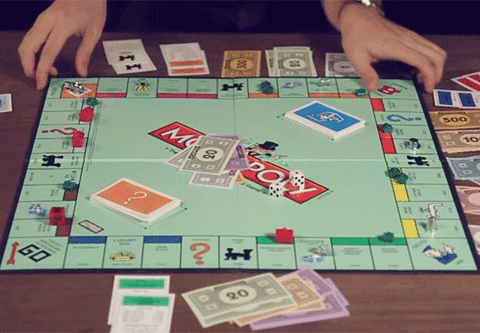Help offset rising pet care costs
Veterinary costs are up 60% over the past decade.
Pet insurance could provide up to 90% reimbursement.
View Money’s top pet insurance picks here.

Welcome Back, Future Funder!
Board games aren’t just entertainment—they’re windows into economics, strategy, and human behavior. Classic games like Monopoly not only mirror but often mock real-world financial systems, offering insights that reach far beyond the game board.
Behind every roll of the dice lies a deeper commentary on the systems that govern our lives.
Bon a petit! 🧑🍳
🍽️ Main Course:💡 What Can We Learn from Board Games?

Think Monopoly is just a game of dice rolls and grudges? Think again. Beneath its colorful board lies a sharp critique of capitalism—one where the rich get richer, the poor go bankrupt, and luck plays a key role.
🏠 Monopoly - A Capitalist Microcosm
Monopoly isn’t just a game—it’s a simplified model of capitalist economies, where property trading and rent-seeking mirror real-world financial dynamics. Players encounter economic challenges like property purchases, rent payments, taxes, and even bankruptcy, making it a fascinating miniature of real-life economics.
🔑 Key Lessons
Asset Accumulation
Success hinges on acquiring properties and developing them.
This reflects the real-world emphasis on building wealth through assets like real estate and investments.
Cash Flow Management
Players must carefully manage their reserves to pay rent and avoid bankruptcy.
This highlights the importance of liquidity and planning for unexpected expenses.
Negotiation Skills
Trading properties involves strategic negotiations, teaching the value of partnerships and deal-making.
Monopoly showcases the basics of economic survival—own assets, manage cash, and negotiate effectively.
⚠️ The Simplifications
Fixed Interest Rates: Unlike real financial markets, Monopoly’s static conditions lack the complexity of fluctuating interest rates and inflation.
Oversimplified Economy: Real-world economies are dynamic, influenced by countless factors like government policies, market trends, and global events.
💡 Takeaway:
Monopoly provides a playful introduction to capitalism, illustrating fundamental financial concepts while reminding us that real-world markets are far more intricate. It’s a game of strategy, foresight, and adaptability—skills that translate well into real-life economic challenges.
The Game of Life takes players on a journey through life’s major decisions—education, career, and family—all with significant financial implications.
Key Lessons
Career Choices:
Different careers come with varying salaries, illustrating how career decisions directly affect financial well-being.Life Events:
Unexpected events, like taxes or medical bills, highlight the need for financial planning and maintaining an emergency fund.Retirement Planning:
The game ends with retirement, stressing the importance of long-term financial preparation.
While educational, the game simplifies the complexities of financial decision-making and doesn’t fully reflect the nuances of real-life financial planning.
💡Takeaway
The Game of Life provides an engaging introduction to financial literacy, offering key lessons in decision-making and planning. However, its simplified model reminds us that real-life finances demand deeper understanding and adaptability.
📈 Stockpile: Simulating the Stock Market
Stockpile is a board game that immerses players in the world of stock market investing, complete with elements like insider information and market manipulation.
Key Lessons
Market Volatility:
Players navigate stock price fluctuations, offering a realistic glimpse into the unpredictability of real markets.Insider Information:
The inclusion of insider information draws attention to ethical considerations and the impact of privileged knowledge in investing.Diversification:
Success in the game depends on building a diversified portfolio, reinforcing the importance of spreading investments to reduce risk—a cornerstone of smart investing.
Stockpile provides a more nuanced perspective on financial markets compared to traditional games, offering players valuable insights into investment strategies and market dynamics.
💡Takeaway
This engaging simulation is not only fun but also educational, equipping players with foundational knowledge of market behavior, strategic planning, and the ethical challenges of investing.
🎓 Educational Value of Financial Board Games
Board games such as Monopoly, The Game of Life, and Stockpile are excellent tools for financial education, providing a risk-free environment for learning about money management.
Benefits
Engagement:
Games make learning about finance interactive and fun, keeping players motivated while absorbing key lessons.Critical Thinking:
Players sharpen strategic thinking and decision-making skills, vital for navigating real-life financial scenarios.Financial Literacy:
Mastering game mechanics fosters a better understanding of real-world financial concepts, such as budgeting, investing, and risk management.
Incorporating these games into educational settings can boost financial literacy and equip individuals with the skills to make informed financial decisions.
💡Takeaway
Financial board games combine entertainment with education, offering an engaging way to build essential financial skills. By blending strategy, interaction, and hands-on experience, they prepare players for the complexities of real-world money management.
🧠 What did we learn?
Simplified Models:
While financial board games simplify complex systems, they offer foundational insights into key economic principles.Strategic Thinking:
Playing these games can sharpen skills like strategic planning and financial decision-making, which are transferable to real-world situations.Educational Tools:
Incorporating board games into education makes learning about finance accessible, interactive, and fun.
Next time you play a board game, look beyond the competition. Explore the economic lessons woven into the gameplay—you might find yourself learning strategies that apply to real life.
Cheers to getting 1% better each week! 🥂
📢 A Message from The Daily Upside
Smarter Investing Starts with Smarter News
The Daily Upside helps 1M+ investors cut through the noise with expert insights. Get clear, concise, actually useful financial news. Smarter investing starts in your inbox—subscribe free.
🧙♀️ Your wish is our command
What did you think of today's email?
Thanks for reading.
Until next time!
Your friends @ Future Funders 🍽️
p.s. If you liked this newsletter, share it with your friends and colleagues here.


